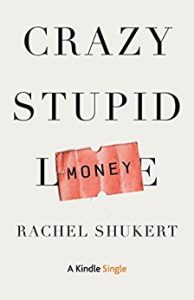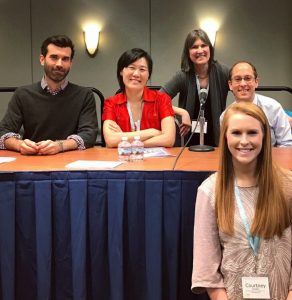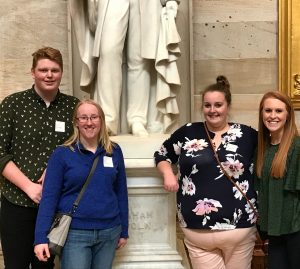
Mar 23, 2017 | Feature |
By Courtney Fowler, President

Alrick Brown, artist and filmmaker. (Photo Courtesy of aalbc.com)
The silence that fell across the room after watching Alrick Brown’s four-minute short film that highlighted historical lynching in America was a profound silence indescribable to those who were not present; the type of silence that makes you hesitant to make even the slightest move or take a breath. As the bright lights flickered to life overhead and my eyes readjusted to my surroundings in Thomas Auditorium, Brown quietly said, for the second time in his presentation, “When I take the time to tell a story, it needs to matter.”
Brown, who was dressed from head to toe in black clothing and spoke with a slight Jamaican accent, is currently working as an Assistant Professor of Undergraduate Film and Television at New York University’s Tisch School of the Arts. Though his dedication and passion for teaching is what drives him, it is his love for film and inspirational life story that truly catches the attention of his audience.
Originally from Kingston Jamaica, Brown immigrated to the United States as a young boy, shortly after the brutal murder of his father when he was just three years old. With such dramatic life events, coupled with a constant feeling of being an outsider in his newly established New Jersey home, Brown found himself seeing the world in a different light. A self-called “natural observer,” Brown began noticing stories around him that others did not see; the stories of individuals that were not being told.
In one particularly transformative experience, Brown traveled in West Africa to see the famous slave castles in Ghana, an experience he now credits as the moment he realized his future as a writer and film director.
“Visiting the slave castles in Ghana was stimulating, it was historically painful, emotional; every fiber in my being was going off. The walls were still stained black with blood,” explained Brown. “As I looked around, I thought to myself, ‘How can I ever explain this experience to others and make them feel what I do?’”
From this life-changing moment in Ghana, Brown fearlessly and relentlessly pursued his dream to tell the stories of those who were not being heard, those who could no longer tell the story themselves. Specifically describing his tactics as “looking at the world with your head tilted slightly toward the side,” Brown discussed the obstacles he faced throughout his career and the challenges of bringing a story to film.
“Art is created within limitations,” said Brown. “We are constantly bound by rules. Take for instance, a Shakespearean sonnet: fourteen lines, three quatrains, and the final couplet. The sonnet is bound by a structure that miraculously gives it meaning and purpose.”
In the final moments of his presentation, Brown presented a behind the scenes look at the making of his Sundance World Cinema Audience Award winning film, “Kinyarwanda.” Maintaining his mission to tell the hidden stories of those otherwise unseen, the film brought together six true stories of individuals who lived through the horrors and survived the Rwandan genocide. Through his work, Brown not only gave a voice to these remarkable individuals, but inspired many in the process.
Moving forward, Brown plans to continue to devote his time seeking out the stories that matter; the ones that change the way people feel and see the world. His most anticipated project is one that features a documentary of children in Jamaica who hold a quiz show competition in their spare time.
Brown was graciously brought to UMF for his presentation by the Honors department, specifically the Honors First-Year Seminar, Travelers’ Tales: Outward Journeys, Inner Truths.

Mar 9, 2017 | Opinion |
By Courtney Fowler, President

(Photo Courtesy of Amazon)
Okay, I’ll be honest here: I’m already deceiving you with this title. For most, writing a book review would require curling up with a great novel, probably with the smell of dusty pages filling the air around them, as they contemplate the deep life lessons and analyze the complex characters that fill the pages. Don’t get me wrong, that sounds lovely, but sadly, who has time for that anymore? So let’s start off by renaming the title to more accurately describe what I did here – “Kindle Single Review: Crazy Stupid Money.”
For those who don’t know, a Kindle Single is probably the best thing ever created – a short, quick read that serves as the perfect excuse to take a break from studying for your test. They’re even better for those of you who like to read but can hardly commit to finding the time to read a 500+ page book. I’m right there with you, don’t worry. Most of the Kindle Singles are free if you have Amazon Prime or Amazon Student, so even if you’re not loving “Crazy Stupid Money,” one of them surely will catch your attention. So, with my spiel on Kindle Single complete, let’s jump into what I am actually supposed to be doing here: reviewing a fabulous short story by Rachel Shukert.
How do you define yourself in this crazy world? Hopefully not by your appearance or the material items that have piled up in your dorm room or apartment over the years. Maybe you view and judge yourself based upon your education level or occupation, feeling most successful when you land an interview at your dream workplace or most likely, on your college graduation day.
These characteristics are certainly notable, but what about money? Are you more likable, more successful, or happier if you have more money? At the center of her book, Shukert discussed the one thing we avoid in most conversations: the importance of money not only as we struggle to survive, but in the process of navigating relationships with those around us.
In one highly applicable tale, particularly for my fellow classmates who, like me, are swimming in mounds of debt that we owe for our college education, Shukert speaks to her struggle of barely having enough money to pay her monthly rent of $3,400. Let’s all take a minute to appreciate the comparatively low rents in Farmington, but the significance still applies.
What stood out was not her struggle to earn money through her freelance writing career, but how such a lack of money made her feel: insignificant, worthless, and desperate. Though Shukert apparently had enough money to continue to order food each night for dinner (I’m a horrible cook too, so this is mildly understandable), her lack of substantial money tore apart her relationship, causing anxiety and a constant sense of frustration. Money certainly cannot buy happiness, but can it make our lives just a little more carefree?
Throughout her short story, Shukert grasps reader’s attention with her wit and humor, while managing to discuss the tricky “adult” topic of how to navigate the world with little income. It is the honesty and bravery of her work that is truly compelling, as she shares deep emotions that many of us fear to examine ourselves. Though masked with a comical storyline that will keep you laughing and engaged, Shukert addresses topics that many of us lack the confidence to face on our own.
This read will be a quick one for you (see: Kindle Single definition, above), but one that you certainly should not pass up. I can always appreciate a book that will make me literally laugh out loud, but more than this, one where I respect the author for her bold and raw emotional tales. Shukert not only exposes herself through her examination of money, power, and love, but will make you ponder the ever-persisting question – “Will I be a better, happier person when I earn more money in the future?”

Feb 18, 2017 | Opinion |
By Courtney Fowler, President

Fowler exploring Washington DC at the 50th annual AWP Conference. (Photo courtesy of Courtney Fowler)
“Write drunk, edit sober” was the advice from award-winning science journalist Jenny J. Chen, as she laughed hysterically and followed with, “take that with a grain of salt people!” Last week at the 50th annual Association of Writers and Writing Programs (AWP) Conference, Chen, along with her fellow panel members, led a discussion on how to balance the fact-based demands of journalism with the creative and emotional craft of creative writing. This laugh out loud panel discussion was only one of the memorable experiences I had at the conference, which for those of you who don’t know, was held in the fabulous, picturesque city of Washington, D.C.
As a whole, AWP is kind of like one of the Scholastic book fairs you went to at your elementary school library, but 10,000 times bigger and on a whole lot of steroids. From the 1,000 tables set up at the book fair, to the 675 possible panel discussions and conference events you can attend, AWP is truly a writer’s dream. Thousands attend the conference each year, ranging from college students who run their school newspaper (yes, that would be us) to world-renowned authors who are celebrating the launch of a new book. With such a range of age and experience, the opportunities to learn and network are endless.

Fowler with 2017 AWP Journalism panelists. (Photo courtesy of Courtney Fowler)
In one panel, Washington Post reporter Dan Zak discussed the troubling reality of the emergence of fake news in recent months. Not only are news stories becoming opinion-based, but the truly alarming fact is that one in five adults receive their news from social media. Social media was created as a platform for human expression, not a credible source for the most current and pressing news stories like some may believe.
In this distressing time, how are journalists able overcome such challenges? Coincidentally, I had this exact conversation with my Uber driver just hours before, a nice man from Uruguay who had recently moved to America to find a better life. “I fear for journalists these days,” he said. “Not only are they constantly targeted by our new president, but must deal with the fake stories that undermine their hard work.”
Serious topics aside, AWP also provided us with a fabulous time to have fun and enjoy the city outside of the panels and book fair as well. Hundreds of off-site events were offered at local restaurants and bars in D.C. We enjoyed socials, dances, and of course, free drinks!

From l to r: Kurt Mason, Rose Miller, Molly Dalton, and Courtney Fowler touring the Capital Building in Washington, D.C. (Photo courtesy of Courtney Fowler)
If you follow the Flyer on any social media platforms, you probably also saw that we were able to take advantage of the excellent location of this year’s conference to explore our nation’s capitol on our own. We enjoyed 60-degree weather (basically summer compared to the horrible amount of snow we just got) while touring the Capitol Building and taking photos with Senator Susan Collins. We visited monuments and saw the most breathtaking view of the city from 15 stories up at the Skydome Restaurant in Arlington. I even got the chance to sneak away and visit a few graduate schools when we had some free time. Because honestly, why wouldn’t I want to live in such an amazing place after graduation?
AWP is more than just our annual trip to a writer’s convention, but a time to leave Farmington behind and experience the wonderful country we live in beyond UMF. And of course, the conference always has a way of sneaking in a few life lessons into panel discussions when you least expect it. My favorite this year was an insightful quote from Zak, one that seemed quite relevant as I pondered my recent trips to graduate schools and the daunting fact that graduation is soon approaching. “Embrace ignorance and do not be afraid to admit when you’re lost,” he said. “It’s a big world out there and we should honor the messiness in our lives.”




